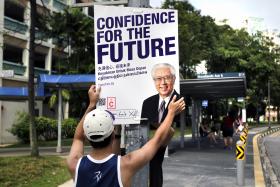The power of rallies & the rally for power
The tongue, notes a facetious Indian saying, has no bone.
Wound tight as a coil over four years, this GE has unleashed a political tongue which, suddenly sprung free, wags unfettered, in every direction, to deafening effect.
It has so far been an entertaining, even edifying, earful.
With one day to go before the silence of Cooling-off Day, the perspectives have largely been aired, politicised and emphasised ad nausem.
Like the masses, I have been fully absorbed by the rallies, moving from venue to venue, risking parking fines and deadlines.
Never have we been enthralled by such a diversity of views. Never have hungry ghosts been able to feast on a smogasbord so lavish.
But step back, look at the big picture with a cold eye, and the rallies have mainly been about the perspectives of the emotional and the practical (with a bit of the municipal).
The PAP offers the perspective of the pragmatic and the practical (and, yes, the municipal).
The opposition has seized - and owned - the emotional.
The crowded, vexatious field has been reduced to, if this were getai, the Lee, Chee and Low show, co-starring Tharman, Tambyah and (to me) the Gentleman GRC team of the PAP's Lim Swee Say.
Now that the candidates have made the most of their nine days of fame through the power of rallies, and with a final burst of 15 rallies today, we should consider the third perspective: The rally for power.
To this cynical mind, it is the answer to the question posed in this column after Nomination Day: Why do they do it?
So this column is about Power; of oratory, of aura, of the passion for power.
POWER OF ORATORY
In a tribute to Mr Lee Kuan Yew, I had written about his sheer power to move the masses with his oratory.
To have listened to and basked in the aura of a LKY Fullerton rally was to have sat at the altar of utter awe.
The speeches of GE 2015, the appeals to the heart heard nightly, though fiery, though impassioned, pale in comparison.
The SDP's Chee Soon Juan has been impressive in his comeback, in his use of personal anecdote, in his diction, pacing and cadence.
But he is far from even a whisker of LKY's shadow.
And then there is the power to move the heartland, which calls for a calibre beyond the clipped English accent.
Hokkien and Teochew were the dialects of my youth. And my political awakening was influenced by the PAP old guard who used dialects to optimum effect.
One was PAP MP Chin Harn Tong. I remember his speeches with relish. The Chin Harn Tongs of his day were not your know-all technocrat, not your natural aristocrat, but men with street cred.
Mr Low Thia Khiang, with his use of Teochew, comes closest. His power to connect with the dialect-comfortable heartland remains key to WP's appeal.
But no candidate has so far stood out enough to sway Singapore on a Richter-scale dimension.
Starved of such a mover, the listless, alternative-seeking masses sought to settle for less. In the humidity, in air thick with haze, you see the smiling faces, desperate to believe, happy to be in solidarity, pleased at being so sensationally seduced.
PASSION FOR POWER
The tongue can be a force for evil and good, at a mere turn or twist. It can move people to extreme evil (Hitler). It can inspire hope or change as Kennedy or Obama or Martin Luther King could, or it can be a force for peace and non-violence as in Mahatma or Mandela.
It is what's behind the tongue that should matter: The motive and the content of character.
In the latest issue of the Economist, Schumpeter writes of experts who have found that power makes people more willing to take risks.
"Power also makes people more likely to break rules, for example by manipulating evidence to suit their purposes."
So it is timely for PM Lee Hsien Loong's emphatic call yesterday - "keep our system clean!" - to be heard above the din of promises and pandering. Keep our system clean and, I'd add, caring.
Schumpeter quotes Prof Jeffrey Pfeffer of Stanford Business School that we have to "accept that powerful people have a dark side. And adjust your thinking to deal with (that) reality".
If power corrupts, can we be discerning enough to identify the candidate most likely to be corrupted, absolutely, by power?
When unproven candidates say they want to do it all for me, my interests, my as yet-unborn grandchildren, I cringe.
My instinct is to wince and ask: Really?
Get The New Paper on your phone with the free TNP app. Download from the Apple App Store or Google Play Store now


